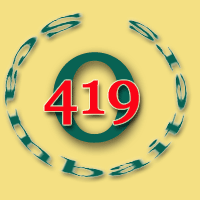
• Home •
Victim´s Story •
Fraud Prevention •
Project GSO •
Hall of Shame •
LINKS •

Check Overpayment Scams: Seller Beware
"Knowledge is divine!"
Thinking of selling a car or another valuable item through an online auction or your newspaper’s classified section? If so, the Federal Trade Commission (FTC), the nation’s consumer protection agency, wants you to know about check overpayment scams.
According to FTC officials, the scams work like this: Someone responds to your posting or ad, and offers to use a cashier’s check, personal check or corporate check to pay for the item you’re selling. At the last minute, the so-called buyer (or the buyer’s “agent”) comes up with a reason for writing the check for more than the purchase price, and asks you to wire back the difference after you deposit the check. You deposit the check and wire the funds back to the “buyers.” Later, the check bounces, leaving you liable for the entire amount.
The checks are counterfeit, says the FTC, but good enough to fool unsuspecting bank tellers.
In a different version of the scam, the FTC says, consumers get a check that has their “winnings” from a lottery. They’re asked to pay taxes or fees. Sometimes, the sender claims to be trapped in a foreign country without any way to cash the check. Either way, federal officials say, if you deposit the check, you’ll lose.
Here’s how to avoid a check overpayment scam:
- Know who you’re dealing with. In any transaction, independently confirm the buyer’s name, street address, and telephone number.
- Don’t accept a check for more than your selling price, no matter how tempting. Ask the buyer to write the check for the correct amount. If the buyer refuses to send the correct amount, return the check. Don’t send the merchandise.
- Consider an alternative method of payment. As a seller, you can suggest an escrow service or online payment service. There may be a charge for an escrow service. If the buyer insists on using a particular escrow or online payment service you’ve never heard of, check it out. Visit its website, and read its terms of agreement and privacy policy. Call the customer service line. If there isn’t one or if you call and can’t get answers about the service’s reliability, don’t use the service. To learn more about escrow services and online payment systems, visit www.ftc.gov/onlineshopping.
- If you accept payment by check, ask for a check drawn on a local bank, or a bank with a local branch. That way, you can make a personal visit to make sure the check is valid. If that’s not possible, call the bank where it was purchased and ask if the check is valid. Get the bank’s phone number from directory assistance or an Internet site that you know and trust, not from the person who gave you the check.
- If the buyer insists that you wire back funds, end the transaction immediately. Legitimate buyers don’t pressure you to send money by Western Union or a similar company. In addition, you have little recourse if there’s a problem with a wire transaction.
- Resist any pressure to “act now.” If the buyer’s offer is good now, it should be good after the check clears the issuing bank.
- Throw away any offer that asks you to pay for a prize or a gift. If it’s free or a gift, you shouldn’t have to pay for it. Free is free.
- Resist the urge to enter foreign lotteries. Most foreign lottery solicitations are phony. What’s more, it’s illegal to play a foreign lottery through the mail or the telephone.
- If you think you’ve been targeted by a check overpayment scam, file a complaint with the Federal Trade Commission at www.ftc.gov or by calling 1-877-FTC-HELP ( 1-877-382-4357 ). For more information on buying or selling via an Internet auction site, visit www.ftc.gov/onlineshopping.
The FTC works for the consumer to prevent fraudulent, deceptive and unfair business practices in the marketplace and to provide information to help consumers spot, stop, and avoid them. To file a complaint or to get free information on consumer issues, visit www.ftc.gov or call toll-free, 1-877-FTC-HELP ( 1-877-382-4357 ); TTY: 1-866-653-4261 . The FTC enters Internet, telemarketing, identity theft, and other fraud-related complaints into Consumer Sentinel, a secure online database available to hundreds of civil and criminal law enforcement agencies in the U.S. and abroad.
Real-looking checks mean real trouble
The National Consumers League (NCL) has joined with the American Bankers Association (ABA) in warning consumers of the growing problem of fake check scams.
Based on complaints reported to NCL’s National Fraud Information Center/Internet Fraud Watch database since last December, when the fake check category was added, these scams are now the sixth most common Internet fraud. Consumers who reported fake check scams to NCL’s fraud programs between January 1 and June 30, 2004 lost an average of $5,000. In many cases, the contact is initiated by email.
The Scam
There are many variations of the fake check scam, but the common thread is a stranger proposing to send the victim a check and have the victim wire money in return. “It may start with someone offering to buy something you advertised for sale, pay you to work at home, or give you an advance on a sweepstakes you won,” explained Susan Grant, director of NCL’s National Fraud Information Center and Internet Fraud Watch programs.
“Whatever the set-up is, the bottom line is if someone you don’t know wants to pay you by check but wants you to wire money back, it’s a scam.” Often the crooks claim to be in other countries and say it’s too difficult to make payment directly, so they’ll have someone in the U.S. who owes them money send the victim a check. The amount of the check is more than the victim is owed, so the victim is instructed to deposit the check and wire the excess back. Or scammers may tell victims to wire some of the money back as fees to collect their “winnings.”
The checks sent to victims are forgeries, but they’re so realistic that even bank tellers may be fooled. By the time the checks bounce, the victims have already wired the money to the crooks. Because bank customers are responsible for the checks they deposit, the victims of these scams are left to repay the bank the money they withdrew against the bad check.
“Federal law requires banks to make the funds you deposit available quickly, but it’s important for consumers to know that just because you can withdraw the money doesn’t mean the check is good,” said Edward Yingling, executive vice president for ABA. “We want to help prevent victimization by alerting consumers and bank personnel to this fraud.”
NCL and the ABA have partnered to create new tips at NCL’s www.fraud.org Web site about fake check scams and are conducting educational outreach to both consumers and bank personnel. Consumers should be aware that:
There is no legitimate reason for someone who is giving you money to ask you to wire money back;
Just because you can withdraw the money doesn’t mean the check is good, even if it’s a cashier’s check;
If a stranger wants to pay you for something, insist on a cashier’s check for the exact amount, preferably from a local bank or one with a branch in your area. For more details about how fake check scams work and how to avoid them, visit the telemarketing or Internet fraud section of www.sid.in-berlin.de/nedkelly-world/index1
© 2006-2011 by GSO • Contact